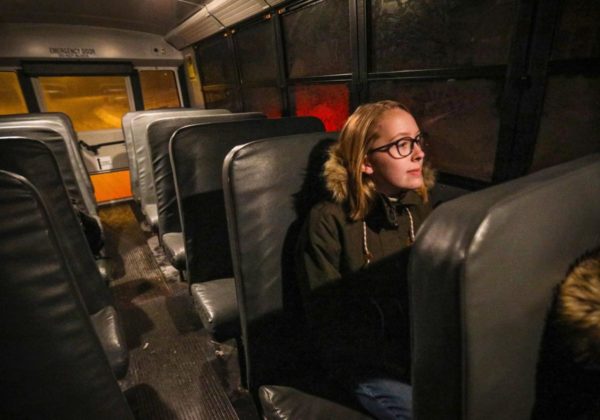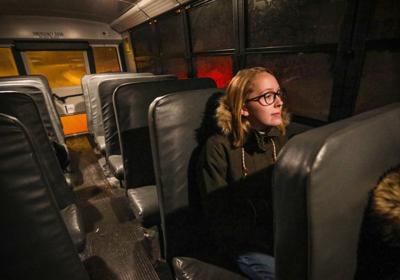
Schools weigh later start times for teens

Mayo High School sophomore Ashleigh Cannon begins her school day with a dark 6:35 a.m. bus ride to school.
Ken Klotzbach, Forum News Service
ROCHESTER, Minn. — On any given weekday, Ashleigh Cannon, 15, one of the thousands of teenagers in her school district asked to sleepwalk through their morning by a start time at war with adolescent biology, steps onto a 6:37 a.m. school bus in a state of truncated recovery. We’re talking six, maybe seven hours of shut-eye.
“If I don’t have a lot of homework, I try to turn off my light at 10:30 p.m.,” she says of her target bedtime.
It’s an admirable game plan, but the science suggests it’s futile. Thanks to a delayed sleep-phase phenomenon tied to the onset of puberty in children the world over — as well as much of the animal kingdom — the Rochester 10th-grader usually tosses and turns until 11 p.m. Though some nights it’s midnight.
Given this late start to her sleep phase, were society organized solely for the benefit of her health and welfare, Ashleigh’s feet wouldn’t touch the floor until 8:30 a.m. at the earliest.
But it’s not, which is why her alarm goes off at 6 a.m.
This widespread adoption of early start times in Minnesota and the Dakotas have adolescents missing out on sleep at a time when they arguably need it the most. Research has shown that teenagers undergo hormonal changes making it difficult to fall asleep until 11 p.m., no matter how early they hit the hay, and advocates say these early start times have created sleep deficits and negative effects on their physical, mental and emotional development — not to mention their studies.
But there’s a building backlash to early start times. Like St. Paul and Edina Public Schools before them, the Rochester school district is now considering a plan to allow middle and upper-grade students to sleep an hour later, a flipping of start times moving the elementary school day an hour earlier. It will cost the district more in busing-related charges, but some say its a trade-off worth making if it means their children gain a better chance at metabolic health and school success.
Unbreakable laws of adolescent sleep
Brainerd, Minn., resident Lisa Jordan said her kids get on the bus at 6:40 a.m., meaning they wake up at 6 a.m. to get ready.
“It’s definitely a challenge rousing my kids who are 11, 13 and 14,” she wrote in an email.
Jordan said she institutes a 9 p.m. quiet/bedtime, but the kids usually fall asleep closer to 10 p.m., which gives them eight hours of sleep, even though they’d prefer to go to bed later. They’re still groggy when they leave though, she said.
It’s not just the Jordan family. It’s hard-wired.
“If you do the math, they need a minimum of eight hours,” says Kyla Wahlstrom, a researcher at the University of Minnesota who pioneered a study of later school start times. “Say they fall asleep at 11,” she says. “The very earliest they should ever get up is 7, and that assumes only eight hours of sleep,” when in fact, as research notes, truly optimal sleep for adolescents is believed to be nine hours and 15 minutes.
Wahlstrom says the wrenching of teenagers from their beds is especially unwise given the critical role of early-morning deep sleep known as REM.
“When kids have to get up at 6:15 for a 6:40 bus, they’re totally missing out on at least one period of REM sleep,” Wahlstrom says. “REM is considered the body’s therapy. It helps people sort out not only factual memories from school, but emotional memories. Miss out on that and it’s devastating. It has cumulative negative effects.”
Power of later start times
Red Wing Public Schools made changes to school start times within the last few years, pushing the high school’s first bell to shortly after 8 a.m.
With four kids in Red Wing schools from elementary and middle school to high school, Red Wing School Board member Janie Farrar said she has seen the benefits of the district’s move to later start times for high schoolers first hand.
“Red Wing has been pretty good about adapting to those health concerns,” Farrar said.
Red Wing’s middle and elementary schools have similar start times to the high school, with most students getting to school around 8 a.m.
Farrar said she has no problems with her kids waking up in time for school — the later start times help — but bedtime before 10:30 or 11 p.m. is uncommon.
“When they’re tired, even, I don’t think they even can try — they have a hard time falling asleep if it’s probably before 10:30,” she said.
For Ty Satter, a senior at Fargo’s Davies High School, school starts about 8:05 in the morning, but because he doesn’t live that far from school he usually doesn’t leave the house until a quarter to 8, according to his mother, Jenny Satter.
That’s most days.
Wednesdays at Davies High are different, school starts about an hour later in the morning.
It’s a practice Jenny Satter said began several years ago when her daughter, Paige, who is now 20 and attending nursing student, was still in high school.
“Ty loves ‘Wednesday Late Day,”’ Jenny Satter said, adding that each school period that day is about 10 minutes shorter so students can end their day at the regular time after getting a later start.
Satter said her son relishes Wednesdays “because you don’t have to get going and out the door as early as you do the other four days of the week.”
Recent data from Wahlstrom and her University of Minnesota colleague Rachel Widome sheds new light on why kids denied enough sleep tend to put on weight.
“The less sleep they got, the less likely they were to eat breakfast, get physical activity, and the more likely they were to drink sugar-sweetened drinks,” Widome says.
The finding that sleep gets kids to eat better is in itself an untapped resource for school districts.
“It’s remarkably difficult to change individual behavior,” she says. “Given that we can increase sleep by delaying school start times, these are really policies that deserve our attention in spite of being inconvenient to school districts.”
Reporters Theresa Bourke, Rachel Kubik, Dave Olson and John R. Russett contributed to this story.




